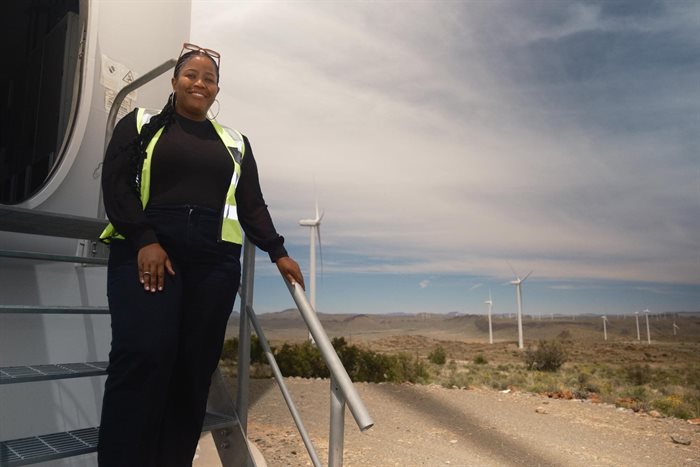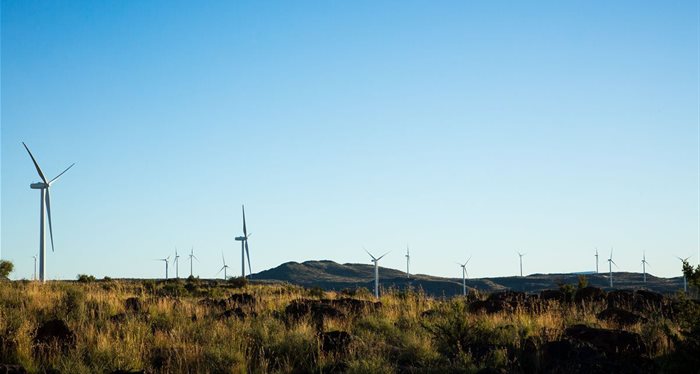DLO Energy Resources Group recently acquired an additional 30% equity stake in the B-BBEE special purpose vehicle (SPV) of the Longyuan Mulilo wind farms in the Northern Cape.

Linda Mabhena-Olagunju, group CEO,, DLO Energy Resources Group
Comprising 163 turbines, the combined capacity of the farms is 244MW, which together have reduced carbon emissions by an estimated 619,900 tons per annum, according to DLO.
The 100% Black-female-owned renewable energy company, led by group CEO Linda Mabhena-Olagunju, is invested in not only driving the renewable energy transition, but fostering diversity and inclusion within the energy sector, and empowering women to contribute meaningfully to a sustainable energy future.
"The renewable energy sector still has a long way to go in terms of transformation and female representation, especially when it comes to ownership and operational involvement," says Mabhena-Olagunju, who is spearheading the DLO African Women in Leadership Summit, which is set for 15 August in Sandton.
We aim to use our platform to empower and support female entrepreneurs by providing them with guidance in identifying opportunities within the renewable energy market.

Longyuan Mulilo wind farm in the Northern Cape. Source: Supplied
This #WomensMonth, Mabhena-Olagunju shared with Bizcommunity a bit about how she kicked off her career in the energy sector, what she loves most about her work, key trends in the energy space, and what attendees can expect at the upcoming DLO African Women in Leadership Summit.
Tell us a bit about yourself and your background?
I followed the most unconventional way to my career - I studied drama at the National School of Arts, I then went on to study law at the University of Cape Town, then a Masters in Oil and Gas Law at the University of Aberdeen in Scotland.
It was in Scotland that I was introduced to the concept of renewable energy, in particular wind farms. I ended up working for the Aberdeen Council as an admin assistant, and because of my law background, I was advanced to project manage their first offshore wind farm development. At the time, we were having rolling blackouts at home, and I saw an opportunity for us here to use renewable energy to address our energy crisis.
I returned home to then work for a law firm specialising in power.
What does a typical workday look like for you?
I wake up around 5am daily and do my morning exercise or stretching, and on good days, I do my breath work exercises. I then get ready for school runs and after that my workday begins.
I typically start my day with a to-do list, followed by a call with my team to set the targets for the day. I am mostly in meetings most days, but in between meetings I am either reviewing legal or financial documents or strategising with my teams on projects.
What do you love most about working in the energy sector?
I honestly enjoy dealmaking, capital-raising and negotiation. I also enjoy working in a space where we make an impact on our country and the economy.
Unpack for us some of the key trends in SA's energy space?
We are beginning to see a shift away from government-backed programmes due to a number of factors, including the challenges in reaching financial close.
We are also beginning to see more flexible PPA terms, with a number of companies focusing on shorter term PPAs to service commercial and industrial customers.
What are some of the major challenges and opportunities ahead for the energy sector?
Grid capacity is a huge challenge right now across the continent. There cannot be a just energy transition without functioning transmission infrastructure. Most of our grids have not been upgraded to be able to handle the intermittent nature of renewable energy.
Where do you believe does the value lie in a diverse, inclusive work environment, particularly in terms of gender representation?
When you have diverse teams, you are looking at the same problem from different angles, informed by your various backgrounds, which means you are able to provide solutions that are more comprehensive.
If you have a diverse customer base, you cannot possibly have a team that is not reflective of this.
How can the public and private sectors help facilitate the participation of more women in the energy sector?
Through policy, government can do more to impress diversity on the private sector. The private sector should also take initiatives without waiting for government, but this seldom happens, or when it does, it is at a slow pace.
Based on your experience, what advice would you give to women pursuing a career in energy today?
I would say build a strong network with people that are already in the sector, as for those women that are in the sector, it’s a lonely journey. I would encourage joining professional organisations such as YPO, which has helped me tremendously on my own leadership journey.
What can attendees of the DLO African Women in Leadership Summit expect?
They can expect some of Africa’s leading CEOs in one room looking at ways to improve representation within their organisations.
They can expect the opportunity to network and create new business opportunities for themselves and, lastly, they can expect to learn new skills on stress management.
Do you have any pearls of wisdom to share this Women's Month or words of encouragement?
I think it’s time we start really taking up space as women.
We need to stop being apologetic about celebrating our successes and voicing our desires.




































